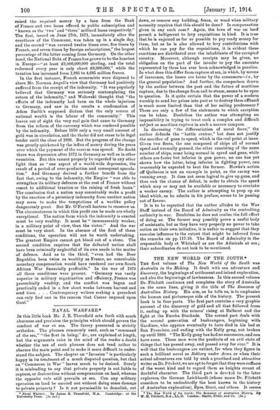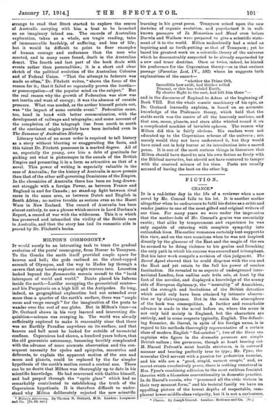THE NEW WORLD OF THE SOUTH.*
THE first volume of The New World of the South was Australia is the Making. It dealt with sea adventure and discovery, the beginnings of settlement and inland exploration, and also the beginnings of lawlessness. In this second volume Dr. Fitchett continues and completes the story of Australia on the same lines, giving it the title of The Romance of Australian history. His aim, as be tells us, is to emphasise the human and picturesque side of the history. The present book is in four parts. The first part contains a very graphic- account of the discovery of gold and all that followed from it, ending up with the miners' rising at Ballarat and the' fight at the Eureka Stockade. The second part deals with the second generation of bushrangers, beginning with Gardiner, who appears eventually to have died in his bed at San Francisco, and ending with the Kelly gang, not broken up until 1880. " The Kelly gang has had no successors, and can have none. These men were the products of an evil state of things that has passed away, and passed away for ever." It is well that the bushrangers are extinct, for when they figure in such a brilliant novel as Robbery under Arms, or when their actual adventures are told by snob a practised and attractive writer as Dr. Fitchett, we are apt to forget that they were ruffians of the worst kind and to regard them as knights errant of doubtful character. The third part is derctrrol to the later explorers, the German Leichbardt (whose name Dr. Fitchett considers to be undoubtedly the best known in the history of Australian exploration), Eyre, Blurt, and others. It neeme.
• 222..F.itimeolill,e{11.73. bola:: Thu R411.11cieldoir. trzialia 14141. t or I, . 13; strange to read that Blurt started to explore the centre of Australia carrying with him a boat to be launched an an imaginary inland sea. The records of Australian exploration, taken as a whole, are tragic reading, tales of immeasurable hardship, of suffering, and loss of life; but it would be difficult to point to finer examples of human courage and endurance than the men who courted, and in many cases found, death in the Australian desert. The fourth and last part of the book deals with events rather than personalities ; it is a short and clear sketch of the political evolution of the Australian Colonies and of Federal Union. "That the attempt to federate was made so often," Dr. Fitchett writes, " shows the force of the reason for it; that it failed an repeatedly proves the inertia— or preoccupation—of the popular mind on the subject." But the real reason why the growth of Federation was slow was not inertia and want of energy ; it was the absence of outside pressure. What was needed, as the author himself points out, was "the impact of some outside event." Federation came, too, hand in band/ with better communication, with the development of railways and telegraphs; and some account of the completion of the telegraph line from south to north of the continent might possibly have been included even in The Romance of Australian History.
Literary talent of no mean order is required to tell history as a story without blurring or exaggerating the facts, and this talent Dr. Fitchett possesses in a marked degree. All of us, especially the young, owe him a debt of gratitude for picking out what is picturesque in the annals of the British Empire and presenting it in a form as attractive as that of a novel. This power of writing is especially valuable in the case of Australia ; for the history of Australia is more prosaic than that of the other self-governing Dominion° of the Empire. In the chronicles of Australia there has been no long-drawn- out struggle with a foreign Power, as between France and England in and for Canada ; no stand-up fight between rival races in the same area, as between Dutch and English in South Africa; no native trouble as serious even as the Maori Wars in New Zealand. The record of Australia has been almost entirely, to use a phrase which occurs in Lord Durham's Report, a. record of war with the wilderness. This it is which has preserved and intensified the virility of the British race in Australia, and that the story has had its romantic side is proved by Dr. Fitchett's books.











































 Previous page
Previous page